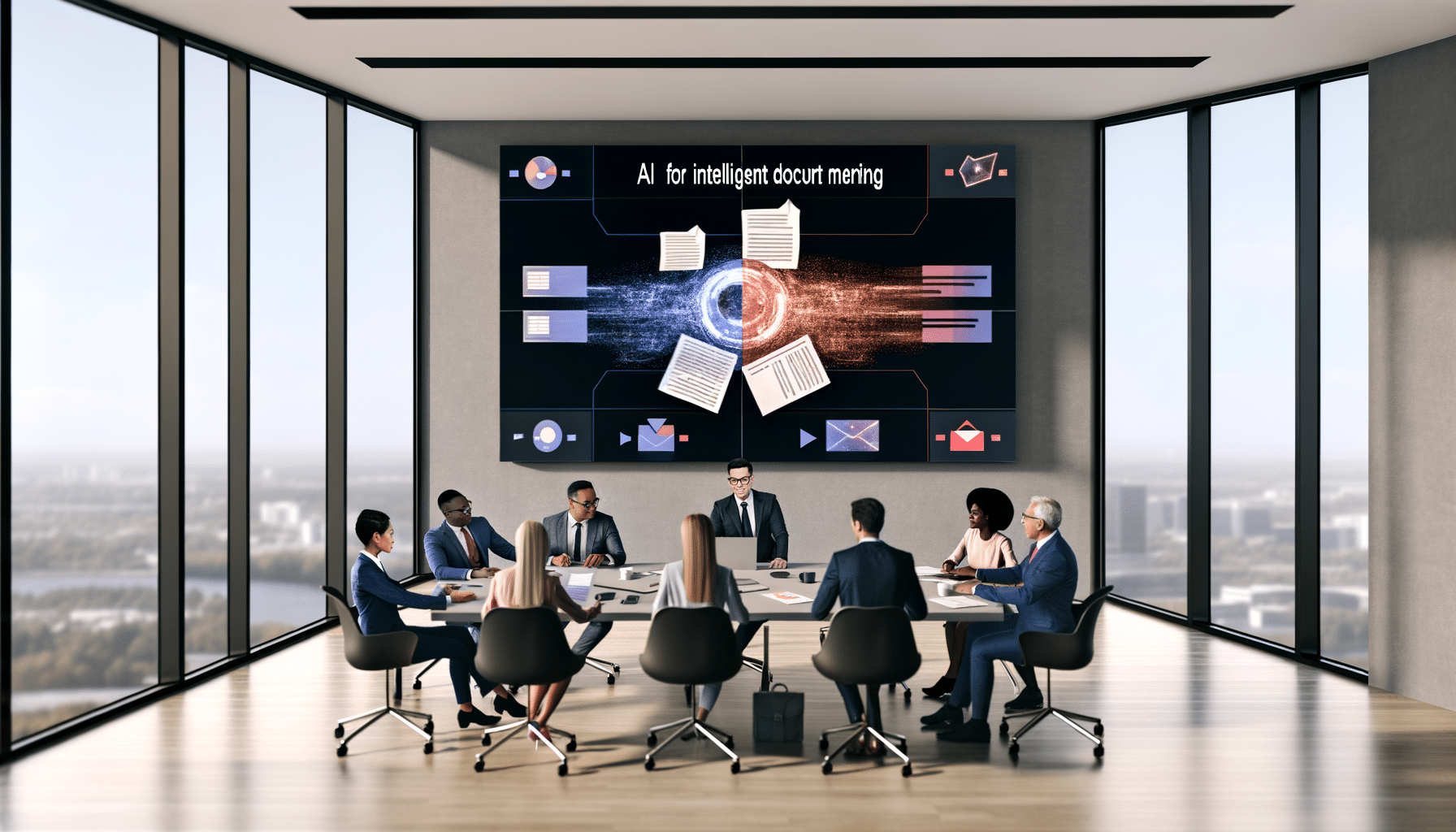- Legal Technology
- November 16, 2024
AI for Intelligent Document Merging

As organizations grow and evolve, the volume of data and documents they need to manage expands exponentially. Navigating this sea of information efficiently—and without errors—is crucial for staying competitive. This is where AI-driven document merging swoops in as a game-changer. It transforms how we see document management, moving it from a manual task to an automated and intelligent process.
The Challenges of Traditional Document Merging
Let’s face it: traditional document merging can be a tedious and error-prone process. Performing it manually involves substantial time and effort, consuming resources that could be better allocated elsewhere. Additionally, there’s always a threat of human error, which can lead to inaccuracies, lost data, or compliance issues—especially in industries with strict regulatory requirements.
In my experience working closely with legal, finance, and compliance professionals, I’ve seen firsthand the burden that manual document management brings. These professionals need solutions that streamline operations and ensure high accuracy and reliability. This is precisely where advanced technologies like AI step in, offering a lifeline for businesses seeking efficiency.
AI: Revolutionizing Document Merging
By leveraging Artificial Intelligence for document merging, organizations can automate the merging process, reducing the risk of human error while significantly boosting efficiency. With the capability of handling large volumes of documents quickly, AI ensures seamless integration of information from various sources, maintaining data integrity and consistency.
Let’s delve into how AI achieves this:
- Automated Classification: AI can automatically recognize and classify document types and formats, reducing the need for manual sorting.
- Smart Merging Logic: Using machine learning algorithms, AI identifies patterns and similarities between documents to merge them intelligently without losing critical context.
- Natural Language Processing (NLP): By understanding the text within documents, AI can merge documents in a way that feels natural and contextually appropriate.
Efficiency Gains and More
It’s not just about merging documents quicker; it’s also about smarter merging. The power of AI ensures that documents align with organizational standards and governing compliance frameworks. The result? An increase in overall productivity and a notable reduction in compliance risks. Imagine having your documents perfectly organized and ready for use in minutes rather than hours!
Real-time Document Management
One of the most exciting aspects of using AI is the possibility of real-time document management. With AI-driven systems, updates and merges can happen autonomously as new documents enter the system. This capability ensures that all documents are up-to-date and instantly available when needed. The ripple effect is substantial, impacting everything from day-to-day operations to long-term strategic planning.
Seamless Integration and Advanced Security
Security is another cornerstone of successful document merging. Incorporating AI improves not only the efficiency of document manages but also fortifies security measures. By utilizing smart protocols and Blockchain technology—like those I’ve implemented in RecordsKeeper.AI—we can provide a secure framework for document processing.
- Blockchain Integration: Guarantees that merged documents are tamper-proof and immutable, preserving authenticity.
- Access Management: Control who merges and accesses documents with precision, maintaining confidentiality and compliance.
Real-World Applications: A Case in Point
Women’s Wear Daily (WWD), a leading fashion publication, battled inefficiencies for years by relying on a manual system for document handling. By adopting AI-driven document management solutions, WWD has streamlined its operations—cutting data processing time by 70%. The firm can now manage huge volumes of data efficiently, allowing it to refocus on strategic growth and industry innovation.
Taking the Leap with AI
The future of document management is here, and it’s intelligent. AI offers a transformational approach that extends beyond the simplicity of merging documents. By automating and optimizing the process, organizations can redeploy their resources to focus on innovation and growth.
As the founder of RecordsKeeper.AI, I am excited about what AI can do for document management across diverse industries. With our SaaS platform, we aim to simplify records handling while ensuring security and compliance.
In conclusion, embracing AI for document merging brings unparalleled efficiency, accuracy, and strategic advantage. I encourage you to explore the potentials AI offers for your organization, and if you’re looking for a comprehensive solution, RecordsKeeper.AI stands ready to help you modernize your record management. Let’s usher in this new era of intelligent document handling—together.
Toshendra Sharma is the visionary founder and CEO of RecordsKeeper.AI, spearheading the fusion of AI and blockchain to redefine enterprise record management. With a groundbreaking approach to solving complex business challenges, Toshendra combines deep expertise in blockchain and artificial intelligence with an acute understanding of enterprise compliance and security needs.
Related Posts

Managing Records During IT System Changes
Keeping records accessible during system updates.
- December 11, 2024

AI for Dynamic Data Masking in Sensitive Records
Protecting sensitive records through dynamic data masking with AI.
- November 16, 2024
Archives
- January 2025
- December 2024
- November 2024
- October 2024
- September 2024
- August 2024
- July 2024
- June 2024
- May 2024
- April 2024
- March 2024
- February 2024
- January 2024
- December 2023
- November 2023
- October 2023
- September 2023
- August 2023
- July 2023
- June 2023
- May 2023
- April 2023
- March 2023
- February 2023
- January 2023
- December 2022
- November 2022
- October 2022
- September 2022
- March 2019
Want to get more content like this?
Signup to directly get this type of content to your inbox!!
Latest Post
Organizing Client Meeting Documentation
- January 1, 2025
Managing Records for Shift Workers
- December 31, 2024
Document Control for Quality Inspections
- December 30, 2024
Handling Sensitive Employee Records
- December 29, 2024





